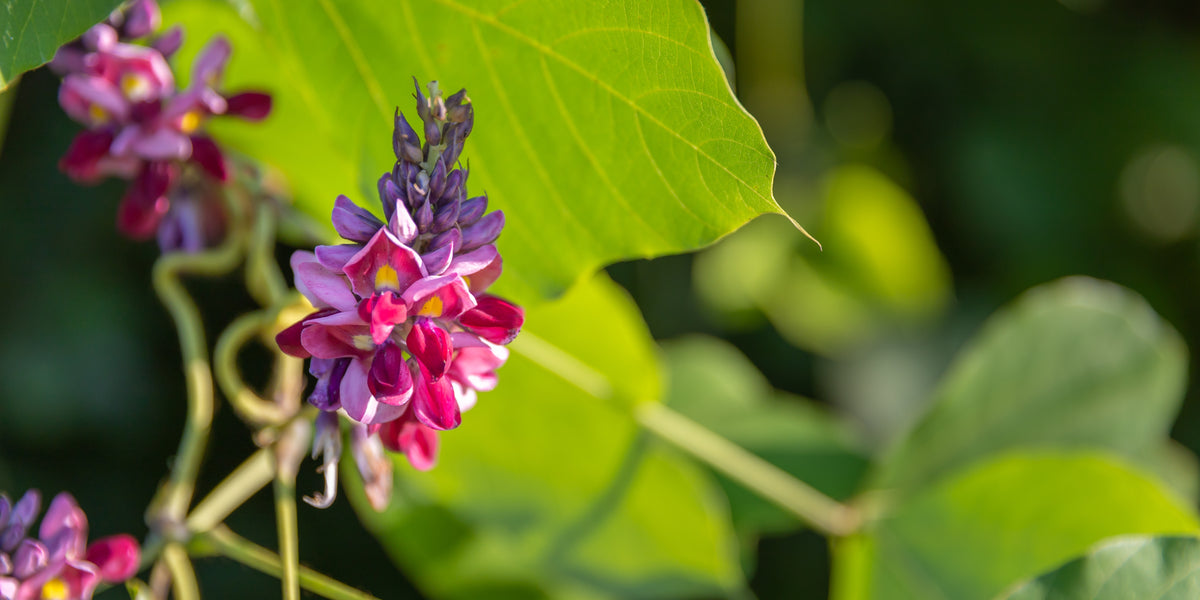This Root Is a Hot Flash Hero
Our society expects women to look like we’re 20-something forever. So it’s natural that the totally normal effects of shifting hormones after 40—or just turning 40—can secretly terrify even the most ardent feminist. Indeed, some things transcend vanity or politics, lke hot flashes and vaginal dryness. They suck for anyone.
What’s stunning about hot flashes and night sweats is that no medical authority has figured out exactly how or why they happen. But science has shown that Kudzu root is a holistic but potent ingredient that can help with hot flashes, vaginal dryness, and more.
Why We Love Kudzu
- Kudzu root contains phytoestrogens, which are naturally-occurring compounds in plants that behave like estrogen in the human body. This means that when your estrogen levels start to dip around age 40ish, supplements with kudzu root can help regulate your hormones. And while many synthetic hormone therapy treatments carry some risk of side effects, you don’t have to worry about phytoestrogens. These are lighter in concentration and have more balanced effects than typical synthetic hormone doses.
- The science on kudzu root is super encouraging. In fact, one study found it to be as effective as a common hormonal pharmaceutical at relieving hot flashes and night sweats.
Key Benefits:
Eases hot flashes and night sweats - yes, this again, but it bears repeating. Because we’ve yet to hear a customer say they miss jolting awake in a puddle of sweat or hanging out in the grocer’s freezer.
Reduces vaginal dryness - the phytoestrogens in kudzu root can help regulate your body’s hormones and reduce vaginal dryness, making sex more pleasurable anytime but especially in late perimenopause or post-menopause.
Improves cognitive function - kudzu root may help reduce brain fog and increase cognitive function in menopausal women.
Traditional Uses:
Kudzu root has a long history of use as menopause support in Traditional Chinese Medicine, so you have several million-to-billion users who’ve come before you.
Traditional Chinese Medicine also uses Kudzu root to treat:
- Fevers
- Diarrhea
- Diabetes
- Heart Disease
About the Plant:
Kudzu is a sprawling green vine native to East China. It has lobed leaves and purple flowers, and the brown, lumpy roots resemble yams. Usually kudzu root is dried before being used as medicine, but you can also eat it the way you would eat other root vegetables.
Found In:
Things to Know about Kudzu:
Although it’s native to East China, kudzu has become wildly invasive throughout the American South East. Because it grows so fast and can overtake buildings and plants, kudzu is sometimes referred to as “the vine that ate the south.” Kudzu is referenced in seminal southern literature and is sometimes even considered an emblem of the South. Daisy Dukes, anyone?
You should avoid taking kudzu root if you have a hormone-sensitive condition. There is also some evidence that kudzu may reduce the effectiveness of hormonal birth control.
Clinical Research
- A standardized kudzu extract (NPI-031) reduces alcohol consumption in nontreatment-seeking male heavy drinkers
- Kudzu root: traditional uses and potential medicinal benefits in diabetes and cardiovascular diseases
- Efficacy and safety of Pueraria mirifica (Kwao Kruea Khao) for the treatment of vasomotor symptoms in perimenopausal women: Phase II Study
- Comparison of Pueraria mirifica 25 and 50 mg for menopausal symptoms
- Medical applications of phytoestrogens from the Thai herb Pueraria mirifica
- Botanicals and Their Bioactive Phytochemicals for Women's Health
- Efficacy comparison of Pueraria mirifica (PM) against conjugated equine estrogen (CEE) with/without medroxyprogesterone acetate (MPA) in the treatment of climacteric symptoms in perimenopausal women: phase III study
- Comparison of Pueraria lobata with hormone replacement therapy in treating the adverse health consequences of menopause
This article is intended for informational purposes and is not intended to replace a one-on-one medical consultation with a professional. Wile, Inc researches and shares information and advice from our own research and advisors. We encourage every woman to research, ask questions and speak to a trusted health care professional to make her own best decisions.




